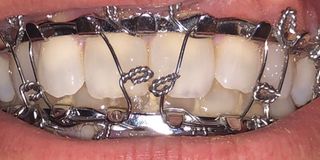
A concerning trend has emerged where people, especially young women, are having their jaws wired shut to limit food intake as a way to lose weight.
This practice, which is gaining popularity on social media, involves using dental wires to connect the upper and lower jaws, making it difficult to open the mouth wide enough to consume solid food or overeat. As a result, individuals are compelled to rely on liquid diets.
Those opting for the procedure, which is becoming increasingly popular in Kenya, argue that it is an affordable, non-invasive alternative that “helps reduce face fat and suppress appetite.”
They also claim that at a cost of about Sh348,000, it is more economical than paying for gym memberships or undergoing expensive weight-loss procedures like stomach reduction surgeries or intragastric balloons.
Nation Lifestyle sought to find out where the procedures are done. All the clinics mentioned on the TikTok posts declined to comment, stating that “the method isn’t recognised or permitted for weight loss in the country.”
One of the clinics was small and dingy. Inside, the smell of staleness rented the air — a mixture of mouldy disinfectant and dust. The cramped room had a wooden dental chair and cluttered shelves with unmarked products. A small counter displayed dog-eared pamphlets about slimming wire treatments.
Health risks
Dental professionals are sounding the alarm, warning that this practice can lead to serious health risks and that unqualified practitioners are taking advantage of the growing demand for this method, offering the procedure in unregulated, poorly equipped clinics.
“There are many adverse effects. If too much force is applied, teeth can become loose or develop cavities due to food accumulation,” says Dr Sylvia Kassami, a dentist at Kenyatta National Hospital.
Dr Sharon Kendi, a dentist at Enamel Elegance Dental Clinic, adds that this procedure is not a weight-loss solution.
“Fixation wires are used to stabilise jaws in cases of fractures, not for cosmetic or weight loss purposes. For example, if you have a broken jaw, we use fixation wires until healing is complete. This is a dental procedure necessary for patients who can’t afford more advanced treatments,” she said.
Research shows the practice of jaw-wiring was popular in the 1980s but fell out of favour as patients developed psychiatric conditions and dental disease.
“It dates to years back, but it has started to resurface. But it is not a solution because you’re not dealing with the true causes of obesity or weight gain,” Dr Kendi adds.
Gum diseases
Another concern is the procedure makes it hard to practice good oral hygiene. Because the jaws are stitched shut, dentists say, it is hard to properly clean the teeth or remove food particles from the mouth, creating a breeding ground for plaque and bacteria, leading to gum disease and cavities.
“The longer one goes without proper oral hygiene, the greater the risk of developing serious dental problems,” she said, adding, “People are opting for these quick fixes because they are cheaper, but the long-term consequences could be far worse, both in terms of health and finances. Fixing the problems that arise from such procedures could cost far more than opting for safer, more sustainable weight loss solutions in the first place.”
There are also psychological risks associated with jaw wiring. Dr Akanksha Ranjan, a consultant orthodontist at Aga Khan University Hospital Nairobi, points out that while jaw wiring may have led to some short-term weight loss in patients years back, it can also result in anxiety, frustration, and disordered eating patterns.
“Patients on a liquid diet due to the wiring often lose weight, but that is a side effect of treating bigger issues [medical conditions such as jaw fractures and temporomandibular joint (TMJ) disorders],” she says.
However, once the wires are removed, many people experience rapid weight gain due to binge eating, negating any potential benefits.
“It was a crude medical treatment. It wasn’t popular before, and it shouldn’t gain momentum now. But with social media, people are sharing videos, bringing it into the limelight,” says Dr Ranjan.
Impaired speech
She adds that a limited study on six people who underwent jaw wiring for two weeks showed minor weight loss, but there was no long-term follow-up to determine whether the results were maintained over time.
“There is no long-term study proving that this method is effective for sustainable weight loss. In contrast, we have overwhelming evidence that extreme diets lead to unhealthy patterns and adverse health effects,” she says.
Additionally, speech becomes impaired, affecting one’s ability to communicate at work, social gatherings, and with family members.
“Imagine not being able to speak properly, brush your teeth, or eat anything other than liquids,” she said.
The social media-driven pressure to achieve a certain body image, Dr Ranjan argues, is contributing to the popularity of this risky practice. She questions the ethics of promoting extreme measures for weight loss, particularly when the potential health risks are not fully disclosed to individuals considering the procedure.
“There is pressure to look a certain way for events, weddings... Instead of promoting unsafe methods, we need to focus on sustainable lifestyle changes such as balanced diets, exercise, and mental well-being,” she says.
Also, the procedure forces patients to rely on liquid diets, which may not provide adequate nutrition.
Rose Etale, a clinical nutritionist, says a weight-loss device that locks your jaw nearly shut is ‘dangerous and concerning,’ and such extreme diets like the ones forced by jaw wiring can lead to malnutrition and cognitive decline. Liquid diets often miss essential vitamins, minerals, and proteins, causing a decline in physical and mental performance.
“When you limit your intake to such a restrictive diet, your brain and body are deprived of the necessary energy they need to operate. The brain, for instance, requires direct sugar from food to perform optimally, and when you don’t provide that, your brain enters preservation mode. This reduces cognitive function, and you’re simply not performing at your best,” she said, adding, “many people, particularly women turn to these extreme diets in search of fast results, but the risks far outweigh the benefits. The body needs balance, not deprivation.”
Dr Kassami of Kenyatta National Hospital also expressed concern about the improper use of dental braces for purely aesthetic reasons. Dental braces have traditionally been associated with correcting misaligned teeth, improving speech, and enhancing the ability to chew. But an increasing number of young people are wearing braces for aesthetic reasons rather than medical necessity to emulate celebrities.
“Unfortunately, because of the demand, some practitioners and unqualified individuals are fitting braces without proper assessment. This is very unfortunate,” she said.
Dr Kassami notes that the improper use of braces can lead to severe dental complications.
“There are needs and wants in life. Braces should be a need, not just a want. If someone does not require them medically but insists on getting them, they are exposing themselves to unnecessary risks,” she said.


